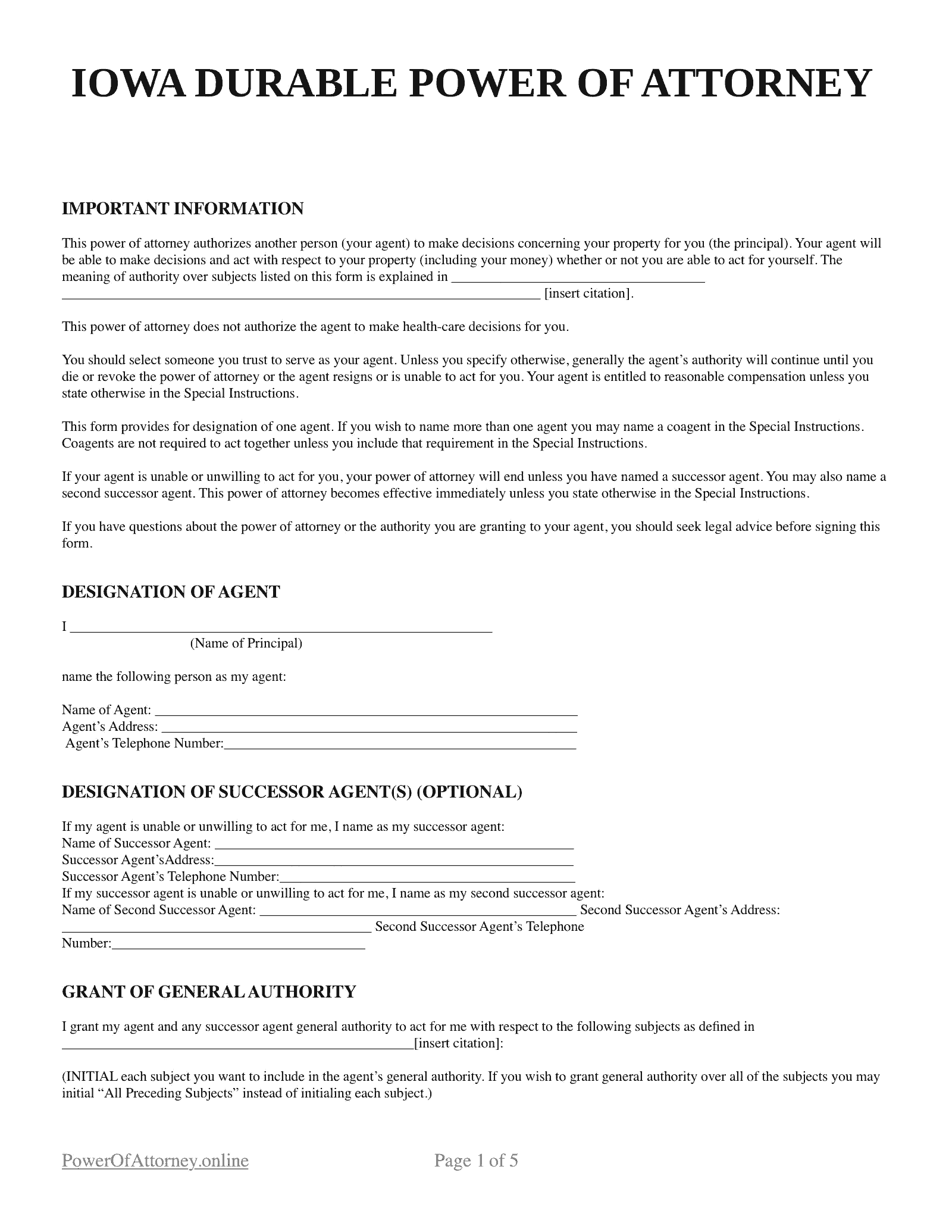Free Iowa Durable Power of Attorney Forms
Most powers of attorney lose their power or authority when the principal becomes incapacitated. But not if you execute a durable power of attorney (POA). It is a legal document that allows a principal to appoint another person, identified as the agent, to make business, financial, and legal decisions on the principal’s behalf.

Iowa Durable Power of Attorney Laws
- Iowa Code §633B.102- this is a section of the law that defines the important terms under the durable POA. Item (3) states, “...with respect to a power of attorney, (durable) means not terminated by the principal’s incapacity” (IA Code § 633B.102).
- Iowa Code §633B.104 - this section of the Iowa Code explains the meaning of the legal document. It states, “A power of attorney created under this chapter is durable unless the power of attorney expressly provides that it is terminated by the incapacity of the principal” (IA Code § 633B.104).
- Iowa Code §633B.105 - this section enumerates the requirements for the execution of the document to make it legal. It reads in part: “An acknowledged signature on a power of attorney is presumed to be genuine” (IA Code § 633B.105).
Signing Requirements in Iowa
The principal must sign the Iowa Durable POA and be acknowledged by a notary public. It is important to note that the named agent cannot be the notary public in this case. And, if, for some reason, the principal is unable to physically sign the document, the law states, “A power of attorney must be signed by the principal or in the principal’s conscious presence by another individual, other than any prospective agent, directed by the principal to sign the principal’s name on the power of attorney” (IA Code §633B.105).
How To Write a Durable POA in Iowa
The POA acts as a written authority for an agent to make decisions on behalf of the principal. It could be on matters of business, finances, and other legal affairs, but not healthcare. Here are the steps to writing one:
1. Choose an agent
Remember that the agent will be acting on your behalf and will continue to do so even when you become mentally incompetent. It is a very important position, and you need to choose someone you can trust with your business and finances.
Many would choose a family member like the spouse, sibling, or child because they are surely people you can trust–in most cases, at least. However, some may prefer getting someone who knows more about the business, such as a professional partner or a lawyer.
Choosing an agent is on a case-to-case basis, so don’t get pressured about who other people may think is the right choice. It is your decision, as principal, to name and appoint an agent you are comfortable with around your business and other affairs.
2. Discuss the responsibilities with your chosen agent
After identifying your preferred agent, schedule a meeting with the individual. Discuss the responsibilities of an agent. While they will be responsible for your finances and assets during incapacity, know that they can only do what you authorize them to do. Make your wishes known.
Most agents don’t receive compensation, especially when they are family members or close relatives. However, it is an option that should be raised. When compensation has been agreed upon, it should be included in the POA. The agent is also allowed to get a refund for food and travel while doing their duties.
3. Download an Iowa Durable POA Template
Find a printable template for a durable POA in Iowa. Make sure the format is one used and accepted in the state. Fill out the form with your personal information and that of the agent. Include specific items you want to be accomplished or implemented in case of incapacity.
4. Sign the document
Sign the durable POA and make sure to provide the date. A notary public must acknowledge the document to make it legal. An agent cannot be the notary public in this case. In case you cannot physically sign the POA, you can appoint someone to sign on your behalf and do it in your presence.
5. Use the Iowa Durable Power of Attorney
The Iowa Durable POA takes effect the moment you sign it unless the document states otherwise. It continues to be effective even when you become incapacitated. The agent must present the document every time they make arrangements on your behalf. The document is considered written permission.